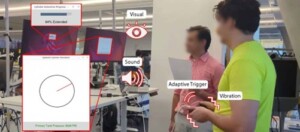POSTED: 17 Jun, 2024
Hydraulic systems are integral to industrial applications that require significant force, such as mining and manufacturing. Despite their power and efficiency, traditional hydraulic systems pose operational risks, especially when relying on binary controls and low-resolution feedback mechanisms. To address these challenges, a research team from the University of Technology, Sydney, led by Danial Rizvi, explored the potential of multi-modal feedback to enhance safety and performance in hydraulic maintenance operations.
The Challenges of Traditional Hydraulic Systems
In industrial settings, hydraulic systems are essential for tasks like installing and removing bushings and bearings. However, these systems typically use binary controls, limiting operators to simple open or close actions. This lack of precision can lead to operational errors and safety risks. Operators often rely on visual and auditory cues, which can be inconsistent and unreliable, increasing the potential for accidents and equipment failure.
Multi-modal Feedback: A New Approach
The research aimed to improve hydraulic maintenance operations by integrating haptic feedback through an adaptive trigger mechanism. This approach provides operators with tactile feedback, simulating the pressure build-up in hydraulic systems. The study compared the effectiveness of this haptic feedback against traditional visual and auditory cues.
Methodology
The team conducted a user study involving 10 participants operating a simulated hydraulic system using a re-programmed DualSense controller. This controller provided four types of feedback: force (through adaptive trigger resistance), visual (pressure readings), sound (auditory cues), and vibration (tactile cues). Participants performed tasks under different feedback conditions to evaluate the impact on performance and user experience.
Performance Analysis
The study measured three key performance metrics: elapsed time, final pressure (PSI), and extension percentage. The results showed no significant differences in task performance across the different feedback types. However, participants expressed a preference for the adaptive trigger in subjective evaluations, noting that it enhanced their control and reduced cognitive load.
Subjective Ratings
Participants rated their comfort and confidence with each feedback type. The adaptive trigger received the highest median comfort rating, while the vibration feedback was the least preferred. Overall, the study found that while all feedback types enabled participants to achieve the desired hydraulic pressures, the adaptive trigger offered slight advantages in user comfort and perceived control.
Implications for Industrial Maintenance
The integration of haptic feedback into hydraulic systems holds promise for improving safety and efficiency in industrial maintenance. By providing operators with more precise and intuitive control mechanisms, multi-modal feedback systems can reduce reliance on less reliable sensory cues and enhance overall operational safety.
Future Research
Further research is needed to explore the long-term benefits of multi-modal feedback in diverse industrial environments. Expanding the participant pool and incorporating real-world scenarios will help validate these findings and refine the technology for broader application.
Conclusion
The study conducted by the University of Technology, Sydney, demonstrates the potential of multi-modal feedback to enhance hydraulic maintenance operations. While traditional feedback mechanisms remain effective, the adaptive trigger offers additional benefits in user comfort and control. As industries continue to evolve, integrating advanced feedback systems into hydraulic operations can lead to safer and more efficient maintenance practices.
References:
- Danial Rizvi, Dinh Tung Le, Munia Ahamed, Sheila Sutjipto, Gavin Paul. “Multi-modal Feedback for Enhanced Hydraulic Maintenance Operations.” University of Technology, Sydney.

Recent News
Australian Cobotics Centre Annual Symposium 2025: A Celebration of Collaboration and Impact
Australian Cobotics Centre Annual Symposium 2025: A Celebration of Collaboration and Impact The Australian Cobotics Centre’s annual symposium b ...
2025 OzCHI Conference
Many of our team were in Sydney last week for OzCHI: Australian Conference on Computer-Human Interaction. Our Deputy Director, Prof Glenda Caldwell ...
Success at the QUT Vice Chancellors Awards for Excellence
We’re thrilled for Professor Jonathan Roberts, Director of the Australian Cobotics Centre and Professor in Robotics at QUT (Queensland University of ...